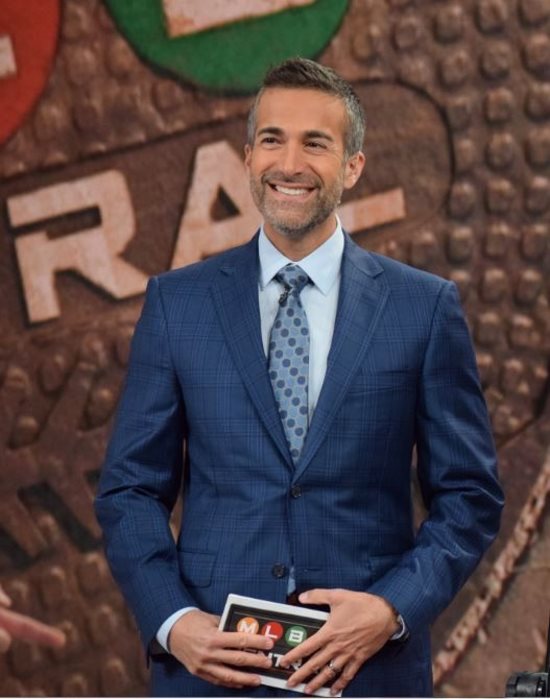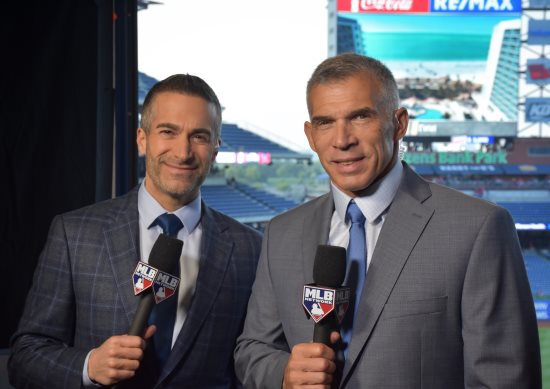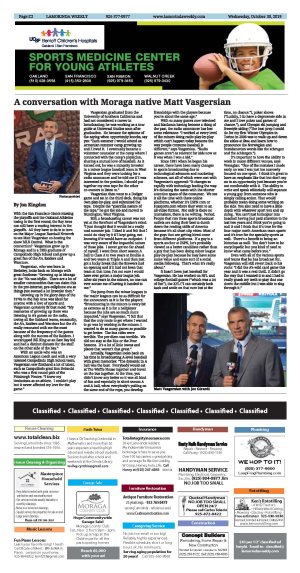| | Published October 30th, 2019
| A conversation with Moraga native Matt Vasgersian
| | | By Jon Kingdon |  | | Photos provided |
With the San Francisco Giants missing the playoffs and the Oakland Athletics losing in the first round, the Bay Area can still have a rooting interest in the playoffs. All they have to do is to turn on the Major League Baseball Network to see Matt Vasgersian co-hosting the show MLB Central. What is the connection? Vasgersian grew up in Moraga and is a 1985 graduate of Campolindo High School and grew up a great fan of the A's, Raiders and Warriors.
 Vasgersian, who was born in Berkeley, looks back on Moraga with great fondness: "Growing up in Moraga in the '70s was idyllic. There are a lot of smaller communities that can claim this in the pre-internet, pre-cellphone era as things just seemed a lot breezier then."
Vasgersian, who was born in Berkeley, looks back on Moraga with great fondness: "Growing up in Moraga in the '70s was idyllic. There are a lot of smaller communities that can claim this in the pre-internet, pre-cellphone era as things just seemed a lot breezier then."
 Growing up in the glory days of the 1970s in the Bay Area was ideal for anyone with a love of sports and Vasgersian certainly fit that mold: "My memories of growing up there was listening to A's games on the radio, loving all the Oakland teams, seasonally, the A's, Raiders and Warriors but the A's really resonated with me the most because of the frequency of the games along with the success of the Raiders. I worshipped Bill King as an East Bay kid and had a distinct distaste for the stuff on the other side of the bay."
Growing up in the glory days of the 1970s in the Bay Area was ideal for anyone with a love of sports and Vasgersian certainly fit that mold: "My memories of growing up there was listening to A's games on the radio, loving all the Oakland teams, seasonally, the A's, Raiders and Warriors but the A's really resonated with me the most because of the frequency of the games along with the success of the Raiders. I worshipped Bill King as an East Bay kid and had a distinct distaste for the stuff on the other side of the bay."
 With an uncle who was an American Legion coach and with a very talented Campolindo High School team, Vasgersian saw firsthand a lot of talent, such as Campolindo grad Ron Delucchi who was a first round pick of the Pittsburgh Pirates: "I knew my limitations as an athlete. I couldn't play but it never affected my love for the game."
With an uncle who was an American Legion coach and with a very talented Campolindo High School team, Vasgersian saw firsthand a lot of talent, such as Campolindo grad Ron Delucchi who was a first round pick of the Pittsburgh Pirates: "I knew my limitations as an athlete. I couldn't play but it never affected my love for the game."
 Vasgersian graduated from the University of Southern California and had not considered a career in broadcasting; he was working as a tour guide at Universal Studios soon after graduation. He became the epitome of the saying when opportunity knocks, say yes: "Each summer I would attend an Armenian summer camp growing up and I loved it. I eventually became a volunteer counselor at the camp where I connected with the camp's physician, sharing a mutual love of baseball. As it turned out, he was a minority investor in a minor league baseball team in West Virginia and they were looking for a radio announcer and he told me if I was interested in the position, I should put together my own tape for the other co-owners to listen to."
Vasgersian graduated from the University of Southern California and had not considered a career in broadcasting; he was working as a tour guide at Universal Studios soon after graduation. He became the epitome of the saying when opportunity knocks, say yes: "Each summer I would attend an Armenian summer camp growing up and I loved it. I eventually became a volunteer counselor at the camp where I connected with the camp's physician, sharing a mutual love of baseball. As it turned out, he was a minority investor in a minor league baseball team in West Virginia and they were looking for a radio announcer and he told me if I was interested in the position, I should put together my own tape for the other co-owners to listen to."
 Vasgersian then went to a Dodger game and sat in the third deck, doing his own play-by-play, and submitted the tape. Despite the "guerrilla nature of the tape," he got the job and moved to Huntington, West Virginia.
Vasgersian then went to a Dodger game and sat in the third deck, doing his own play-by-play, and submitted the tape. Despite the "guerrilla nature of the tape," he got the job and moved to Huntington, West Virginia.
 Still, a broadcasting career was not yet at the forefront of Vasgersian's mind: "I just thought that it would be a really cool summer job. I liked it and felt that I could do okay by it if I kept going, not knowing if it would have an endpoint. I was very aware of the impactful nature of those jobs. I never got too far ahead of myself. I went from short season A ball to Class A to two years at Double A and two years at Triple A and then just got a lucky break that the Brewers had an opening and if it had not been that team at that time, I'm not sure I would have ever gotten a major league job. After six years in the minors, no one can ever accuse me of having it handed to me."
Still, a broadcasting career was not yet at the forefront of Vasgersian's mind: "I just thought that it would be a really cool summer job. I liked it and felt that I could do okay by it if I kept going, not knowing if it would have an endpoint. I was very aware of the impactful nature of those jobs. I never got too far ahead of myself. I went from short season A ball to Class A to two years at Double A and two years at Triple A and then just got a lucky break that the Brewers had an opening and if it had not been that team at that time, I'm not sure I would have ever gotten a major league job. After six years in the minors, no one can ever accuse me of having it handed to me."
 The jump from the minor leagues to the major leagues can be as difficult for the announcers as it is for the players: "Broadcasting in the minors is every bit as extreme as it is for a ballplayer because the jobs are so much more impacted," says Vasgersian. "I felt that that the only route to get where I wanted to go was by working in the minors. I wanted to do as many games as possible to get better. The bus rides were terrible. The per-diem was terrible. We did not stay at the Ritz or the Four Seasons. It's a lot of little towns and places that weren't that great."
The jump from the minor leagues to the major leagues can be as difficult for the announcers as it is for the players: "Broadcasting in the minors is every bit as extreme as it is for a ballplayer because the jobs are so much more impacted," says Vasgersian. "I felt that that the only route to get where I wanted to go was by working in the minors. I wanted to do as many games as possible to get better. The bus rides were terrible. The per-diem was terrible. We did not stay at the Ritz or the Four Seasons. It's a lot of little towns and places that weren't that great."
 Actually, Vasgersian looks back on his time in broadcasting A-level baseball with great memories: "The dynamic in A ball was the best. Everybody would eat at The Waffle House together and travel on the bus together. At the time, you didn't know any better so it was all kind of fun and especially in short season A and A ball, when everybody's pulling on the same end of the rope, you develop friendships with the players because you're about the same age."
Actually, Vasgersian looks back on his time in broadcasting A-level baseball with great memories: "The dynamic in A ball was the best. Everybody would eat at The Waffle House together and travel on the bus together. At the time, you didn't know any better so it was all kind of fun and especially in short season A and A ball, when everybody's pulling on the same end of the rope, you develop friendships with the players because you're about the same age."
 With so many games now televised and blackouts having become a thing of the past, the radio announcer has lost some relevance: "I worked at every level of the minors doing radio play-by-play which can't happen today because the way people consume baseball is different," says Vasgersian. "Radio games aren't as relevant for kids now as it was when I was a kid."
With so many games now televised and blackouts having become a thing of the past, the radio announcer has lost some relevance: "I worked at every level of the minors doing radio play-by-play which can't happen today because the way people consume baseball is different," says Vasgersian. "Radio games aren't as relevant for kids now as it was when I was a kid."
 Since 1991 when he began his career, there have been many changes in sports broadcasting due to technological advances and marketing schemes, not all of which were met with Vasgersian's approval: "It changes so rapidly with technology leading the way. It's dictating the tastes with the shorter attention spans of the consumer. We see it all the time with these online platforms, whether it's ESPN.com or Foxsports.com where they went to an all-video format. Not only is there no journalism, there is no writing. Period. People that run these sports broadcast outlets are doing their best to dumb down the reading skills of America because it's all short clip video. Most of the guys that are getting hired come from different platforms. If a guy is a sports anchor at ESPN, he's probably viewed as a better candidate rather than a guy that has been doing minor league play-by-play because he may have some name value and some sort of a social media following. That's what it's really about."
Since 1991 when he began his career, there have been many changes in sports broadcasting due to technological advances and marketing schemes, not all of which were met with Vasgersian's approval: "It changes so rapidly with technology leading the way. It's dictating the tastes with the shorter attention spans of the consumer. We see it all the time with these online platforms, whether it's ESPN.com or Foxsports.com where they went to an all-video format. Not only is there no journalism, there is no writing. Period. People that run these sports broadcast outlets are doing their best to dumb down the reading skills of America because it's all short clip video. Most of the guys that are getting hired come from different platforms. If a guy is a sports anchor at ESPN, he's probably viewed as a better candidate rather than a guy that has been doing minor league play-by-play because he may have some name value and some sort of a social media following. That's what it's really about."
 It hasn't been just baseball for Vasgersian. He has worked on NFL and college football games ("which was a lot of fun"), the XFL ("I can certainly look back and smile on that now but at the time, no chance."), poker shows ("Luckily, I do have a degenerate side in me and I love poker and games of chance."), and Olympic ski jumping and freestyle skiing ("The best prep I could do for my first Winter Olympics in Torino in 2006 was to walk up and down the aisles at Ikea and learn how to pronounce the Norwegian and Scandanavian words like the schrugen and the schlargen.").
It hasn't been just baseball for Vasgersian. He has worked on NFL and college football games ("which was a lot of fun"), the XFL ("I can certainly look back and smile on that now but at the time, no chance."), poker shows ("Luckily, I do have a degenerate side in me and I love poker and games of chance."), and Olympic ski jumping and freestyle skiing ("The best prep I could do for my first Winter Olympics in Torino in 2006 was to walk up and down the aisles at Ikea and learn how to pronounce the Norwegian and Scandanavian words like the schrugen and the schlargen.").
 It's important to have the ability to work in many different venues, says Versagian: "One of the mistakes I made early on was I was just too narrowly focused on one sport. I think it's great to have an emphasis like that but don't say no to an opportunity just because you're not comfortable with it. The ability to write and speak editorially will separate a young guy from someone who is simply calling action. That would probably mean doing some writing on the side. You also need to have a little depth with whatever sport you end up doing. You can't just helicopter into baseball having just paid attention to the last two years and think you're going to nail it and I think that it's true for the four major north American team sports and it's true for the specialty sports as well. There's a benefit to being an historian as well. You don't have to be encyclopedic but you kind of need to know what came before you."
It's important to have the ability to work in many different venues, says Versagian: "One of the mistakes I made early on was I was just too narrowly focused on one sport. I think it's great to have an emphasis like that but don't say no to an opportunity just because you're not comfortable with it. The ability to write and speak editorially will separate a young guy from someone who is simply calling action. That would probably mean doing some writing on the side. You also need to have a little depth with whatever sport you end up doing. You can't just helicopter into baseball having just paid attention to the last two years and think you're going to nail it and I think that it's true for the four major north American team sports and it's true for the specialty sports as well. There's a benefit to being an historian as well. You don't have to be encyclopedic but you kind of need to know what came before you."
 Even with all of the various sports and teams that he has broadcast for, Vasgersian will still revert back to his roots: "I did the A's wild card game this year and it was a real thrill. It didn't go the way that I wanted it to and I had to really gnash my teeth to play that one down the middle but I was able to slug through it."
Even with all of the various sports and teams that he has broadcast for, Vasgersian will still revert back to his roots: "I did the A's wild card game this year and it was a real thrill. It didn't go the way that I wanted it to and I had to really gnash my teeth to play that one down the middle but I was able to slug through it." |
 | | Matt Vasgersian with Joe Girardi | | | | | | | | | | | |




